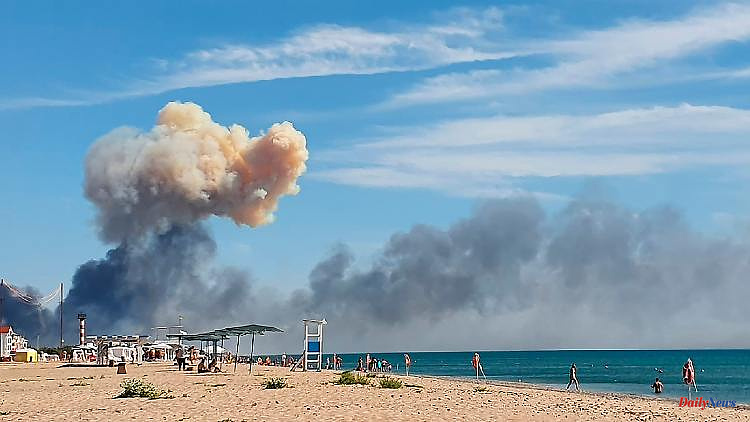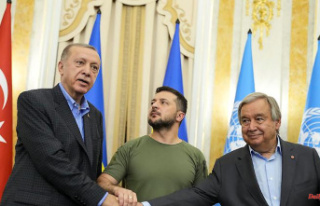After the attacks in Crimea, Moscow is coming under increasing pressure. It is still unclear who is behind the explosions. The FSB speaks of an "act of sabotage" and arrests men from the Islamist organization Hizb ut-Tahrir. Experts say it could be a red herring.
The ground on the Crimean Peninsula, annexed by Russia, trembled for the second time in just a few days. Multiple explosions rock Russian bases, including an ammunition dump. So far, no one has claimed responsibility for the attacks. Ukraine expresses satisfaction, but keeps a low profile. The Russian secret service FSB meanwhile speaks of an "act of sabotage" and arrests six men from the Islamist organization Hizb ut-Tahrir.
The FSB did not disclose exactly who the men are. While the Kremlin has not officially blamed the Islamists for the explosions, the arrests were made in the Crimean town of Dzhankoy, not far from the destroyed ammunition dumps. This makes it appear that the arrests are linked to the attacks. Since the Russian annexation of Crimea in 2014, Ukrainian Crimean Tatars have been arrested and convicted on several occasions on charges of Hizb ut Tahrir membership. The Islamist group is banned in Russia as a terrorist organization.
According to the Federal Agency for Civic Education, Hizb ut-Tahrir (Arabic for "Liberation Party") originated in Jerusalem in the early 1950s. The movement was founded by the Palestinian jurist Taqi ad-Din an-Nabhani. The core of its ideology initially represented a liberation of Palestine from the "occupation" of Israel. In the years that followed, Hizb ut-Tahrir's focus shifted to liberating all Muslims worldwide from perceived Western oppression. There are also branches of the organization in Germany. They operate underground as they have been banned since 2003.
Since the outbreak of the Ukraine war, more and more Arab scholars and academics have been claiming that Crimea and Ukraine are Islamic countries that must be "won back," writes the Middle East think tank Mena-Watch. One of them, the Jordanian Islam scholar Said Radwan, said in an interview in March that every country in which Islamic law once prevailed is Islamic country forever. The interview was broadcast on the Lebanese channel "Al-Waqiya TV", which is said to be closely linked to the Hizb ut-Tahrir organization.
The Islamists thus have a motive for the attacks on Crimea. And there is one more thing: large sections of the Muslim minority were exposed to massive state repression during the Soviet era and clearly reject the current Russian rulers. Russia's intervention in Syria also plays a role. It remains questionable, however, whether Hizb ut-Tahrir is behind the latest attacks in Crimea.
"There are always Islamist organizations trying to become active on the territory of the Russian Federation," political expert Stefan Meister told ntv.de. It is therefore not impossible. For Meister, however, it sounds more like a diversionary maneuver by the Russians. He doesn't see a plausible explanation for the fact that Islamist groups suddenly strike where Ukraine is attacking. Rather, the Kremlin is pushing other actors to avoid holding Kyiv accountable. "Blaming Ukraine for the attacks and thereby acknowledging that they are capable of striking Crimea is highly problematic for Russia," said Meister.
Defense expert Wolfgang Richter from the German Institute for International Politics and Security (SWP) agrees. That would be a loss of reputation for Russia, he says to ntv.de. It is very likely that individual actors from Islamist groups are in the area. However, Richter considers it unlikely that these were operations by saboteurs. Videos of the first explosions in Novofeodorivka a week ago raised suspicions that they were rocket attacks. "Due to the range and precision, it could have been either a Neptune or an HRIM2 missile from the Ukrainians," Richter suspects. There were several explosions that went up almost simultaneously over a distance of several hundred meters. In the case of an act of sabotage, it is difficult to imagine that several actors could have come unnoticed to the premises of a well-secured airfield from distant locations at the same time in order to trigger such a synchronized chain of denotation.
For security expert Stefan Meister, the explosions are part of a new offensive. "We are in a new phase of the war, in which Ukraine is capable of launching attacks on the territory of Crimea. We will see this more often with a view to the areas controlled by Russia."
According to the experts, Russia is in a quandary: On the one hand, they cannot constantly blame explosions in ammunition depots or on combat ships like the Moskva because the weaknesses of the Russian army would be demonstrated. On the other hand, they cannot blame Ukraine for the attacks, either, recognizing that Ukraine is capable of such attacks and increasing pressure on Russia to counterattack. But Ukraine isn't officially taking responsibility either, "because that would put them in a spiral of escalation," explains Meister.
Meanwhile, a video has been circulating on the internet that purportedly shows the arrest of one of Hizb ut Tahrir's members. It shows Russian soldiers marching into a house and putting a man's hands behind his back and against the wall. The Ukrainian journalist Katerina Sergatskova from the online news portal "Zaborona Media" accuses the FSB of staging the arrest. In addition, it is assumed that the six Islamists were arrested before the explosion on Tuesday, according to Richter. Who is really behind the attacks on Crimea will only be revealed in the coming weeks.












